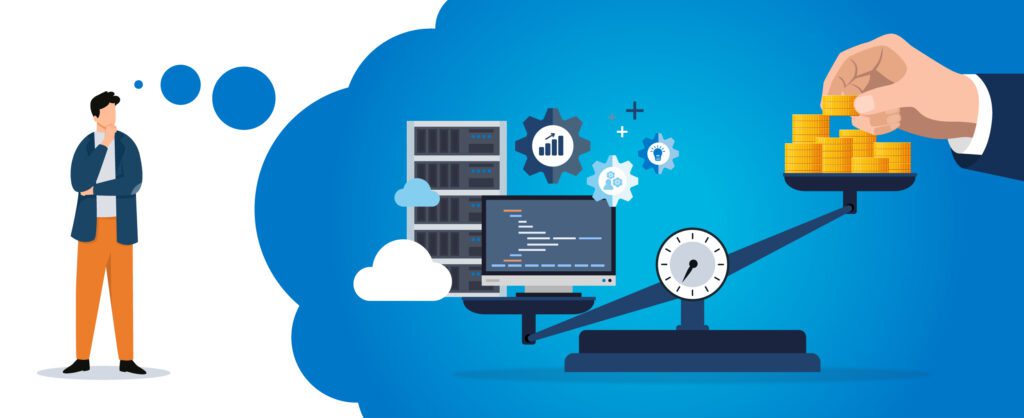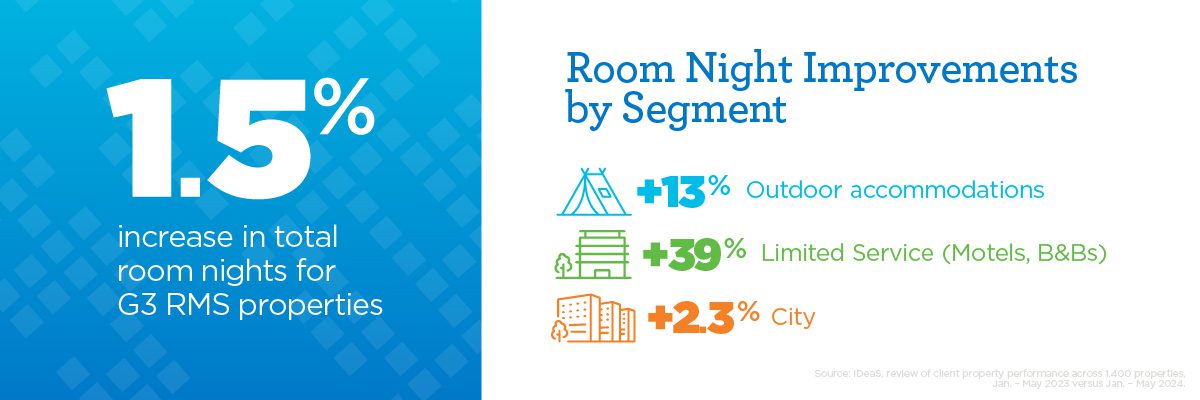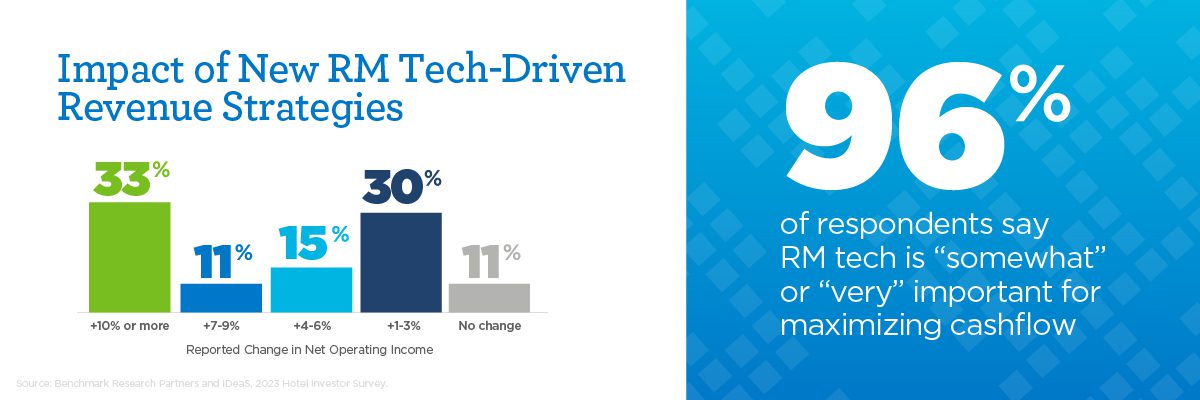It’s a question hotel operators across the world have wrangled with for years. Is it worth the time, money, and effort to invest in a revenue management system (RMS)? It’s a big decision with a big impact to match. But with the right system in place, hoteliers stand to greatly improve their ability to strategically navigate a quickly changing and complex industry and in turn, improve their overall profitability.
Today, more hotels of all sizes and operating models are concluding that an RMS is a worthwhile investment. In fact, Skift’s Hotel Tech Benchmark dashboard currently estimates 15 million—or 51% of all rooms worldwide—are influenced by revenue management technology.
While that figure includes systems of varying sophistication and capabilities, it shows we’re reaching a global tipping point where hoteliers in most regions can expect to find a property aided by revenue management technology within their competitive set.
So, what’s driving this trend in RMS adoption? For one, the benefits are hard to deny. Let’s take a look at some of the facts, features, and functionalities leading more hoteliers to say an RMS is definitely worth it.
Worth It: 5 Ways an RMS Benefits Your Property
The benefits of an RMS come in a variety of forms. Here are some of the top reasons for investment.
1. Better competitive decisions based on advanced demand forecasting
The foundation of any effective revenue strategy is built upon demand forecasting. When revenue leaders have a clear picture of the demand for their inventory of product offerings, they’re able to make smarter decisions regarding pricing, inventory controls, distribution, marketing and more.
“The fact that the software is looking out two years gives you a lot of space to focus on different areas of your strategy because you know it’s being taken care of. You’re not going to be surprised by a spike in occupancy and how the rate adjusts.”
The granular room, product, length of stay, and market segment demand forecasting power of G3 RMS provides a clear competitive edge for hoteliers by driving automated revenue-maximizing decisions and setting the stage for longer-term strategic moves.
2. Take time back from the tedious with automation
Without the help of an RMS, revenue leaders are often saddled with a workload that unfortunately includes a lot of repetitive tasks. These efforts, while important, eat into their time for strategic planning, collaboration with commercial teams, and other higher-impact work.
For instance, a 2024 HEDNA report on distribution found that 53% of large international hotel chains, 46% of mid-size hotel chains, and 56% of independents identify managing rate parity across distribution channels as a key area of manual effort. That’s a time-consuming task that can be greatly streamlined via automated revenue management tools.
A time-consuming manual distribution process can also result in missed opportunities. Think of it this way: if it takes an hour or more to roll out a pricing decision, is your team more likely to pass on implementing a small-but-positive change? Or several of them? These seemingly small, automated adjustments begin to pile up over time and can drive substantial revenue growth that would otherwise be missed.
3. Generate more revenue with improved length-of-stay and occupancy
Effective revenue management isn’t just a matter of filling rooms on a first-come, first-serve basis. It’s about ensuring the highest value bookings take priority. During periods of high-demand, hoteliers have the option to be more selective about who books and can implement controls that drive additional occupancy on adjacent “shoulder” nights. This is a proven practice that brings in more revenue overall than simply pushing rates up during a busy day or two.
With automated inventory controls and pricing strategies that consider the big picture revenue impact of a change and adjust for optimal outcomes, G3 RMS has proven effective at boosting total room nights and overall revenue.
4. Better capitalize on group business & M&E opportunities
Group business and M&E revenue is often a big piece of many hotels’ business mix. In their eagerness to get a solid foundation of group bookings secured, many sales teams end up missing revenue opportunities through unnecessarily low pricing or giving away valuable meeting space as an incentive. While it’s clear sales teams need flexibility to land group business opportunities in a competitive market, navigating these decisions and finding the ideal mix of group and transient business can be a tall task without the help of an RMS.
With the ability to quickly evaluate a group business opportunity and understand the potential revenue impact from displacing transient business, commercial teams can make better-informed decisions that drive better revenue.

Make Smarter Group Pricing Decisions
Learn how evaluation tools can help your property make more from group business opportunities.
5. Improved cashflow and net operating income
While not guaranteed, positive topline revenue growth spurred by an investment in revenue management tech helps with profitability and cashflow. Among surveyed hotel investors who’ve used revenue management tech to implement a new strategy, 25% of respondents reported a 10%+ increase to net operating income.
The boosts to the bottom line and cashflow feed into a virtuous cycle of improved lending terms, investments in property improvements, and increasing the overall value of a property.
A strategic investment for sustained success
An investment in an advanced solution like G3 RMS isn’t a move that brings a nice-but-fleeting boost to your property. This is a strategic decision that better positions your organization for navigating a fast-shifting market—whether the change in the market is good, bad, or a mixed bag. With advanced forecasting to better understand where demand is fluctuating and automation enabling faster, more precise reactions, this tool helps revenue leaders manage risk and proactively adapt to keep their properties well-positioned among their competition. The case for that investment is worth making for any hotelier still on the fence.
The value of an RMS is hard to ignore. For more on what makes implementing G3 RMS a sound decision for the future of your property, see our latest report: “Unlocking Revenue Potential: The Need for Strategic Investment”.


